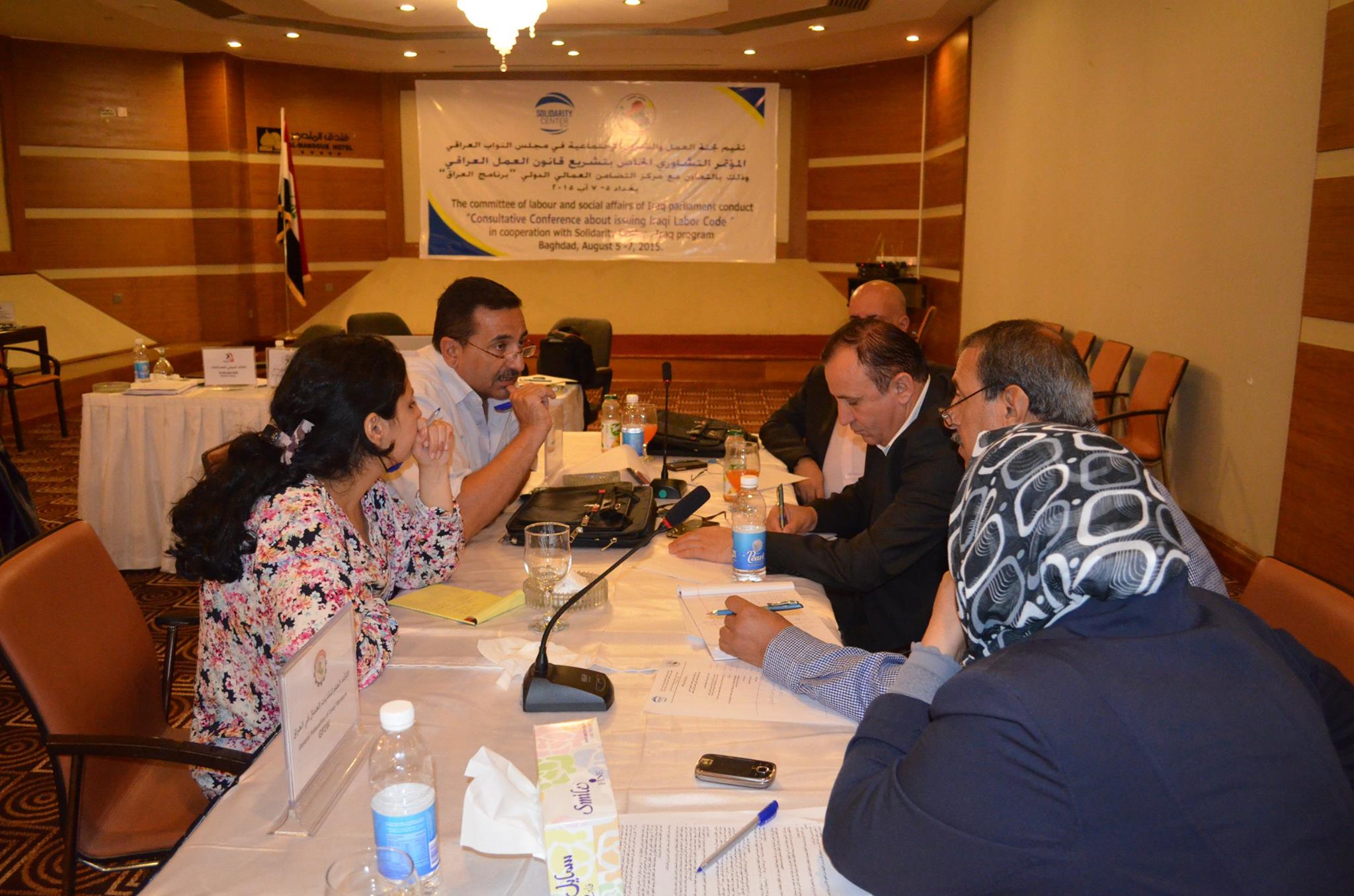
Aug 20, 2015
The Iraqi parliament passed a new labor law on Monday, marking a victory for workers and civil society who have long fought for a legal framework that would protect the interests of workers. The consensus version of the law was hammered out by representatives of workers and civil society with government officials earlier this month during a consultative conference.
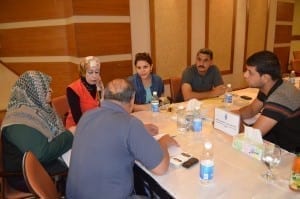
Labor, Civil Society hammer out new labor law with Iraqi government officials
“For the first time in Iraq, the unions [were] sitting to discuss and amend the labor law,” said Adnan AL Safar, executive board member of the General Federation of Iraqi Trade Unions (GFITU).
The new labor law, which includes most amendments proposed by Iraqi unions, allows for collective bargaining, including for workers without a union; further limits child labor; provides improved protections against discrimination at work and, for the first time, against sexual harassment at work. The law also enshrines the right to strike, banned since 1987. Government will no longer restrict workers to affiliation with only one union or federation, and coverage is expanded to include all workers not covered by Iraq’s civil service law.
Iraqi unions credit the consultative conference held in Baghdad August 5–7, supported by the Solidarity Center, for ending debate on the draft and prompting its passage into law.
“[It] urged the labor committee to speed up work on the law to present it to the parliament for voting,” said Saied Naima, president of the General Federation of Workers and Unions in Iraq (GFWUI).
Agreed Karrar al-Musawi, secretary of the Labor and Social Affairs Committee: “The conference led to the uniting of visions and [finalization of] the labor law draft compatible with the views of all parties as well as International Labor Organization standards.”
More than 40 women and men from Iraq’s six main labor federations; representatives of six Iraqi non-governmental organizations; and officials from parliament’s speaker’s office; the parliamentary Committee on Family, Women and Children, Legal Committee, and Labor and Social Affairs Committee; Ministry of Labor and Social Affairs; and the Iraqi High Commissioner for Human Rights finalized amendments to the draft labor law at the consultative conference.
Representatives of six major Iraqi labor federations—including the General Federation of Iraqi Workers (GFIW), Federation of Workers Councils and Union in Iraq (FWCUI), General Federation of Workers and Unions in Iraq (GFWUI), Iraqi Federation of Oil Unions (IFOU), General Federation of Iraqi Trade Unions (GFITU) and Kurdistan United Workers Union (KUWU)—have worked toward a new labor law with Solidarity Center support since June 2012, including a public-awareness campaign for passage of a law compliant with international labor standards, worker mobilization and an international campaign garnering support from global union federations, including IndustriAll, ITUC, the AFL-CIO, the British Trade Union Congress (TUC) and USLAW.
Read a letter to parliament by Iraqi labor federations regarding passage of the new law here, in English and Arabic.

Aug 13, 2015
More than 200 participants from 45 countries took part in Labor Migration: Who Benefits? A Solidarity Center Conference on Worker Rights & Shared Prosperity Aug. 10-12, sharing strategies on empowering migrant workers through organizing unions and associations, reforming the often exploitative labor recruitment process and ensuring access to justice for migrant workers.
Driving the dedication, passion, commitment of the activists who assembled in Bogar, Indonesia, over these past few days are the stories of migrant workers–whose strength, resilience and hope for improving their lives fuels their search for good jobs to improve the lives of themselves and their families.
Several migrant workers described their struggles and successes, via video, throughout the conference. Here are their stories.
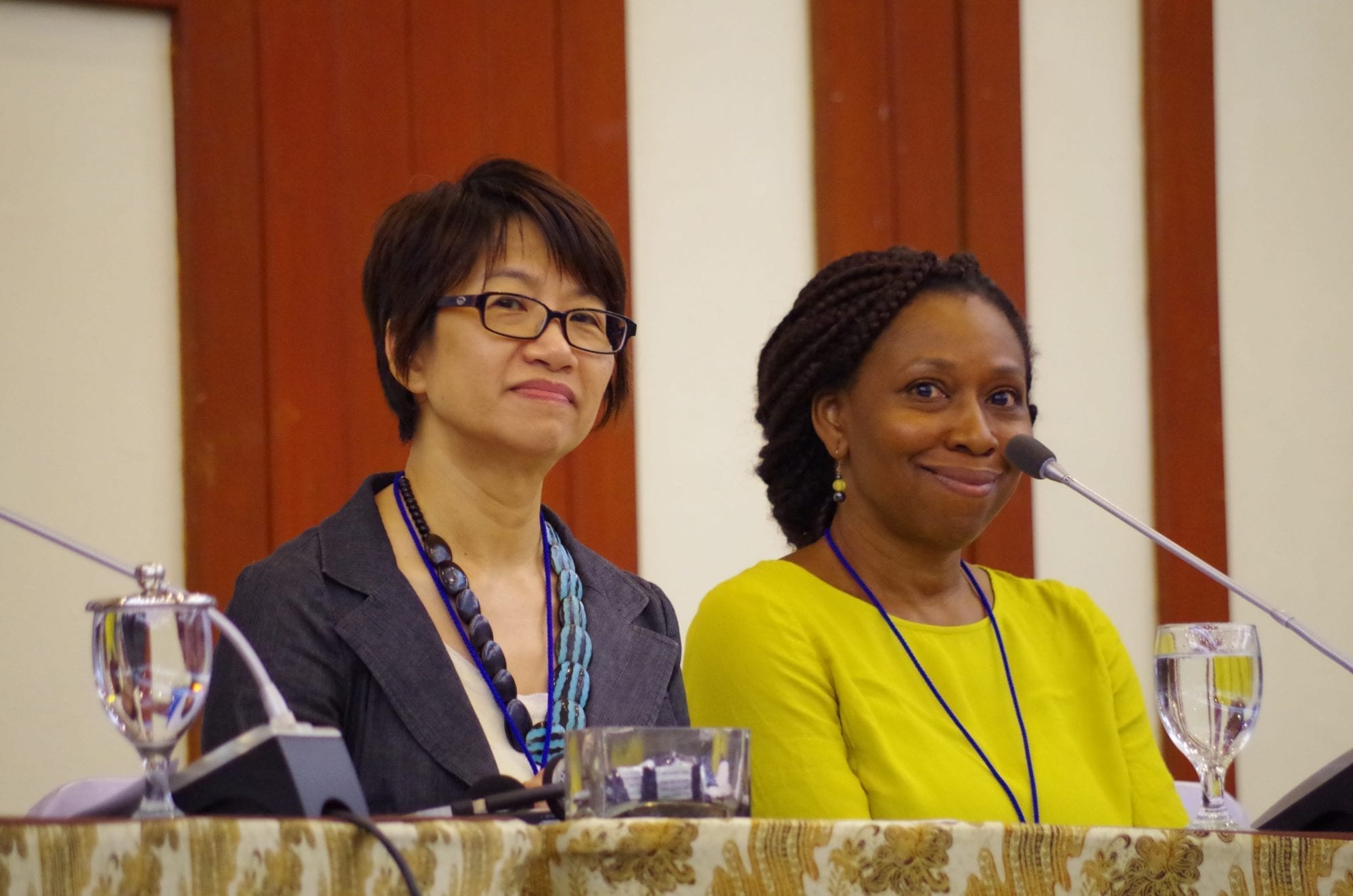
Aug 13, 2015
With a rousing call to action, Solidarity Center Executive Director Shawna Bader-Blau urged the more than 200 participants in the final session of the Solidarity Center’s Labor Migration: Who Benefits? conference to “exercise our voice for a bigger push for global democracy.
“Let’s break down all those barriers between us to create a global civil rights movement,” Bader-Blau said.
Speaker after speaker, on the podium and in the conference room, strongly reiterated the call for unity, between unions and human rights organizations across the globe.
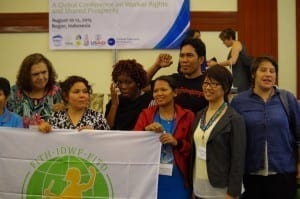
Domestic workers and allies gather at the Labor Migration: Who Benefits? conference. Credit: Solidarity Center/Kate Conradt
“When we act collectively to ensure that people all over the world have their human rights … enjoy the full range of their social protections, then we all have political clout,” said Chidi King, Equality Department director of the International Trade Union Confederation.
“Today’s labor movement has a very clear commitment that we have to act on the right, on the dignity of migrant workers,” King said.
Colin Rajah, coordinator and co-founder of the Global Coalition on Migration said, “our commitment is to re-engage a strategic commitment between unions and migrant workers.”
Noting how the AFL-CIO is “expanding partnerships to protect fundamental labor rights, Charlie Fanning, AFL-CIO global resource coordinator, said “we really need to build a broad-based movement to achieve this vision of shared prosperity.”
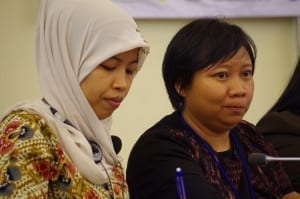
Baria and Anis Hidayah from Migrant Care joined the final conference plenary session.
Participants also committed to specific actions, including pushing the International Labor Organization (ILO) for creation of a gender-based violence convention; urging their countries to pass ILO conventions supporting the rights of migrant workers and domestic workers; demanding their unions do more to outreach among and support migrant workers; and helping more domestic workers, many of whomare migrant workers, form unions. Wisborn Malaya, secretary general of the Zimbabwe Chamber of Informal Economy Associations (ZCIEA), urged participants to support workers in his economy who are under attack in the informal and formal sectors.
Anis Hidayah, executive director of Migrant Care, which co-sponsored the conference, introduced Baria, a former migrant worker in Malaysia who now is working for Migrant Care in Jakarta.
“The forum that discusses migrant workers, has to involve us, the migrant worker,” said Baria. “It has been quite long, the injustice we have been living with. This afternoon, I am so glad our voice has been heard in this forum.”
Aug 12, 2015
Police entered trade union offices today and, following earlier arrests blocking street protests, are creating a climate of intimidation limiting public challenge to a recent court ruling causing thousands of workers to lose their jobs, with more job losses expected.
“The mass retrenchments emanating from the Supreme Court ruling of July [17], 2015, will exacerbate an already difficult position for the working people of Zimbabwe,” says Godfrey Kanyenze, director of the Labor and Economic Development Research Institute of Zimbabwe (LEDRIZ), a Harare-based economic think tank.
Several truckloads of riot police entered offices of the country’s main trade union confederation, the Zimbabwe Congress of Trade Unions (ZCTU), this morning in Harare, continuing a campaign of intimidation against workers protesting mass job losses.
Overwhelming police presence, and brief detention of protest organizers in Harare, prevented marches scheduled to take place across the country on Saturday. Riot police entered ZCTU offices, dispersing a crowd of protesters gathered there and detaining ZCTU Secretary General Japhet Moyo and President George Nkiwane, along with a handful of other trade union leaders preparing to lead the protests.
A ruling handed down by the Zimbabwe Supreme Court last month prompted the popular protests, organized by Zimbabwe’s largest labor federation, the Zimbabwe Congress of Trade Unions (ZCTU).
The ruling makes it legal for all employers to terminate workers’ contracts at any time, without offering them layoff benefits, by giving them three months’ notice. Up to 18,000 people have already lost their jobs, and more job losses are expected.
“This ruling marks the last nail on formal employment,” says Kanyenze.
In recent years there has been a dramatic shift in Zimbabwe of workers from the formal to the informal sector—where jobs are comparatively precarious, low-paid and without social protection.
Almost 95 percent of the estimated 6.3 million people in Zimbabwe’s workforce were defined as employed in the informal economy, according to a 2014 government report. And, in the three years to 2014, informal-sector employment grew by 29 percent, from 4.6 million people to 5.9 million.
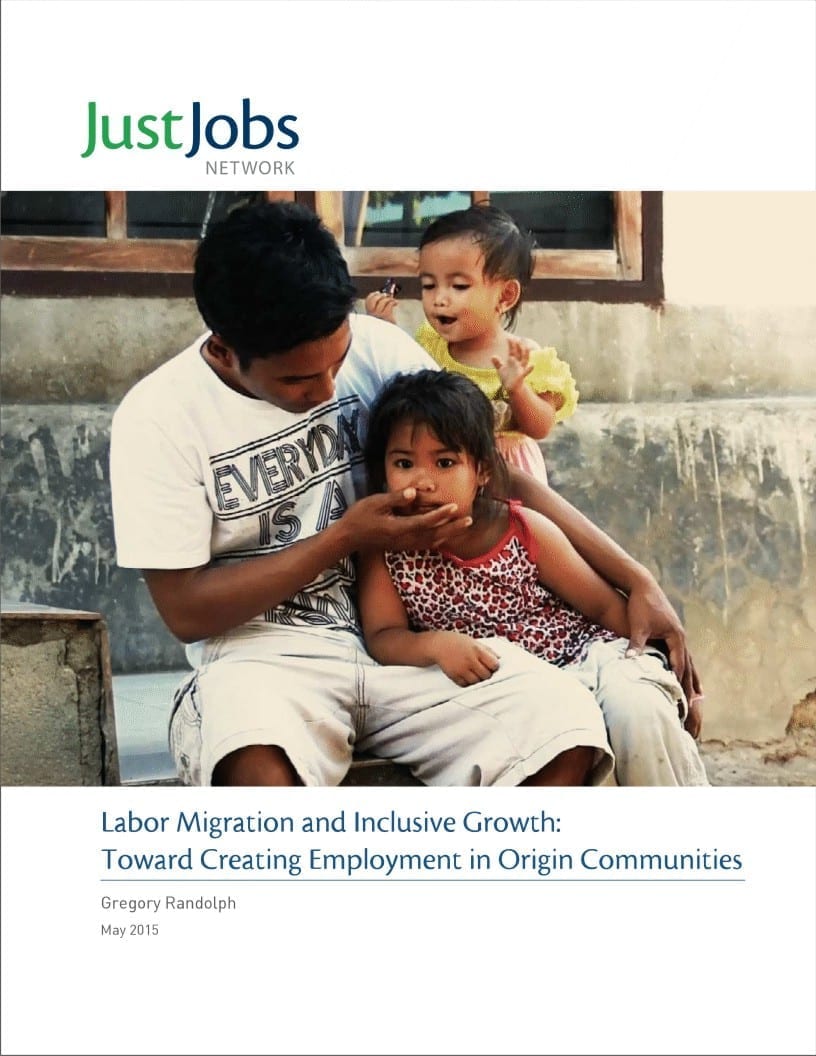
Aug 12, 2015
Too many governments are using the money migrant workers send back home to fuel their economies rather than create good jobs that would build and support their communities, according to panelists at an afternoon plenary session at the Solidarity Center conference on labor migration.
“One of the key drivers of migration is lack of stable employment,” says Greg Randolph, deputy director of the India-based JustJobs Network.
Randolph and Anis Hidayah, Migrant Care executive director, took part in the panel Case Study: Impact of Labor Migration on Origin Communities. Migrant Care is co-sponsoring the Aug. 10-12 conference, Labor Migration and Inclusive Growth: Toward Creating Employment in Origin Communities.
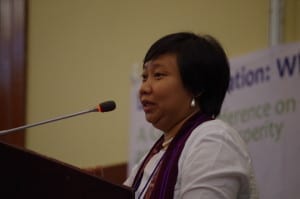
“Migration is still not having a positive impact for communities.”–Anis Hidayah, Migrant Care executive director. Credit: Solidarity Center/Kate Conradt
“Migration is still not having a positive impact for communities,” says Hidayah.
Both Hidayah and Randolph discussed the need for a new development model in which governments focus on job creation and supporting workers from the village-level on up, rather than trickle down benefits from the national level.
Randolph described the results of a new JustJobs study that examined migration in the Indonesian province of West Nusa Tenggara which sends the highest ratio of its population for overseas work. It found that wages sent home by Indonesians who migrate for work are not supporting local job creation in origin communities. Further, it finds that the poorest communities in Indonesia are most likely to send migrants into informal economy jobs.
Noting that remittances can reduce poverty, Randolph reiterated that they have not furthered the type of development that creates good jobs.
“We need to move toward a paradigm where migration is a choice rather than a compulsion,” he said, echoing other speakers throughout the three-day conference.
Speaking from the floor, Agatha Tan, counsel for the Coalition of Immokalee Workers, pointed out the role of financial institutions in the labor migration process
“When we talk about remittances, we forget about how much role financial institutions play,” she said.
Hidayah outlined how Migrant Care is working at the village level to educate workers on their rights before they migrate, while providing them with online tools for reporting employment abuses and other forms of exploitation.
Randolph also showed a video based on the report, Labor Migration and Inclusive Growth: Toward Creating Employment in Origin Communities, which was produced with funding by the Solidarity Center and U.S. Aid for International Development.
Tim Ryan, Solidarity Center regional program director for Asia, facilitated the panel.








